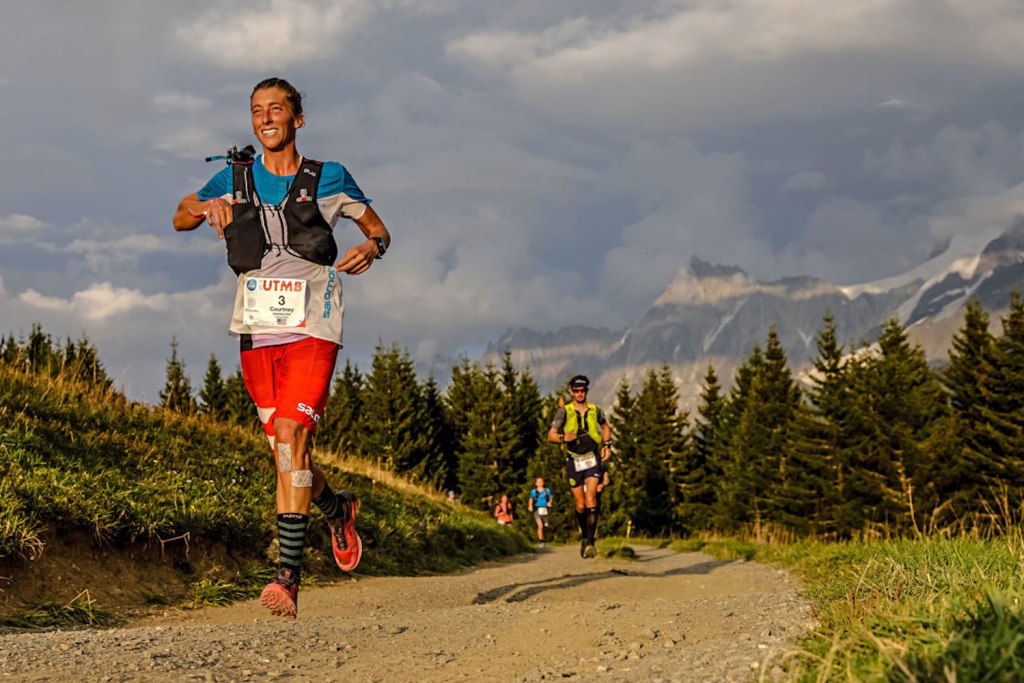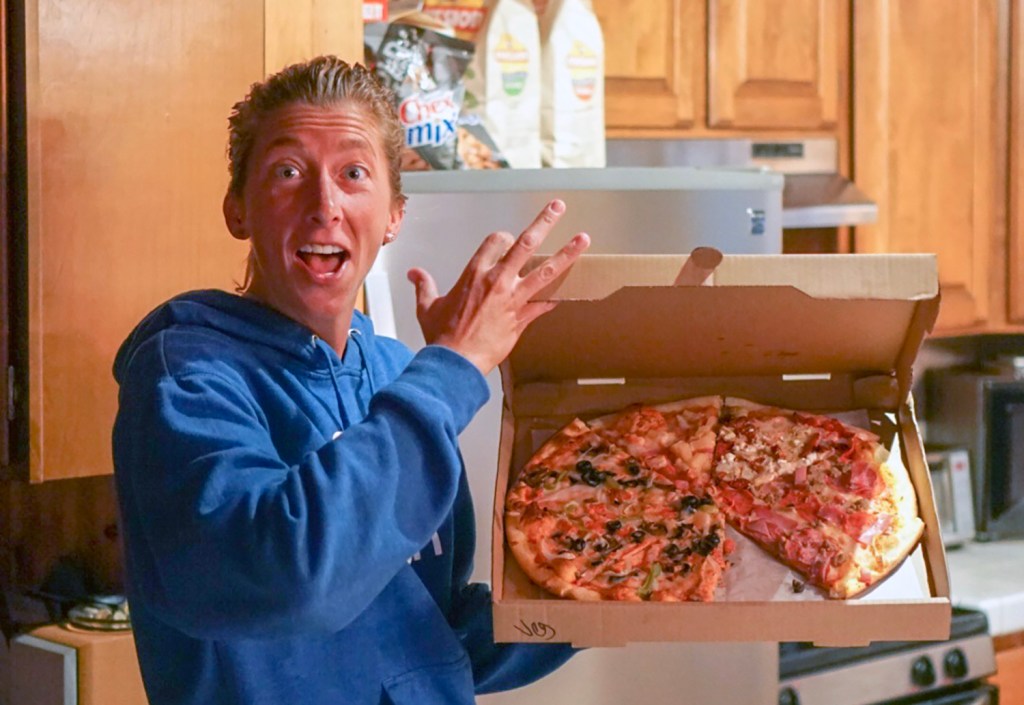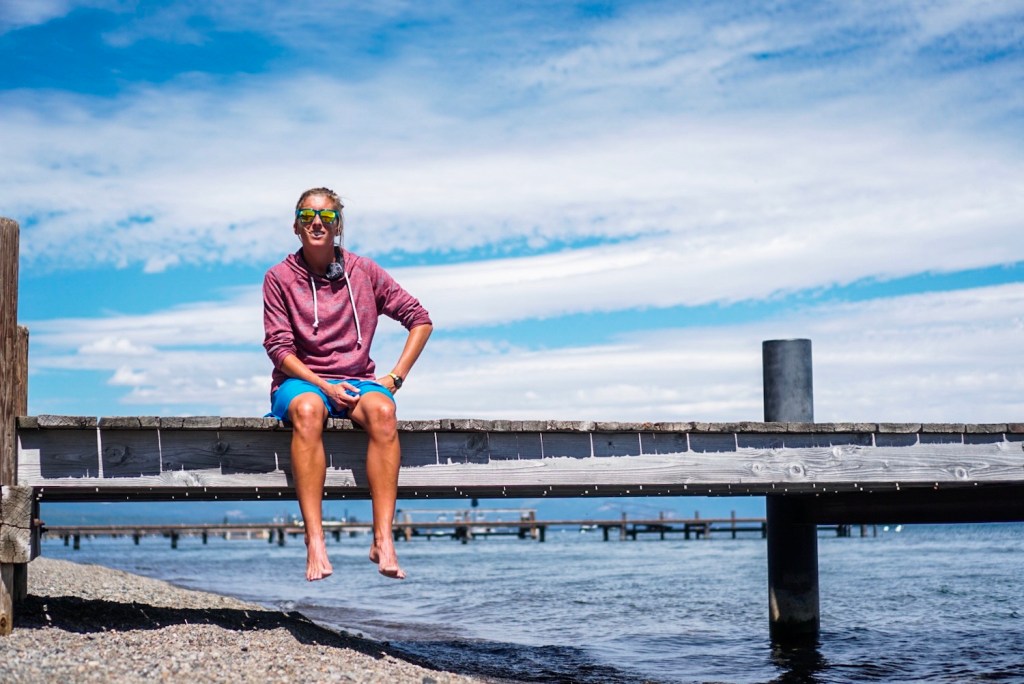The night before: I haven’t spent a lot of time on mountain trails this past month. And this is a very mountainous race. That hip injury set me back. It was a short buildup to get ready for a 100-mile race. I’m not sure what’s going to happen, but I want to put myself in it and try to compete. I want to see how this plays out.
In late August, American ultrarunner Courtney Dauwalter arrived in Chamonix, France, to toe the line at the 106-mile Ultra Trail du Mont Blanc (UTMB), one of the world’s most prestigious trail-running races. The course climbs more than 32,000 vertical feet, mostly at high elevations, and attracts elite runners from around the globe.
Dauwalter wasn’t feeling 100 percent. Two months earlier, in June, while leading the race at record pace, she’d had to bail out of California’s Western States 100 due to a hip injury. She’d won the race the year prior, and it is not in her nature to not finish something she’s started. “At mile 67, my hip just stopped working. It buckled,” she said. “I had no choice.”
The injury meant she could only run a limited amount in July, and although she was able to pedal a bike, she said she had less than one month of run training to prepare for UTMB.
The starting line: Some ultramarathons have a line in the dirt and a hundred people and that’s it. Here, thousands of people are in the race, with thousands more lining the streets. I’ve never experienced something like this. It’s very cool to feel the energy. I want to soak it all up. I can’t stop grinning. I like the unknown that’s coming. Knowing that you get to be out on this adventure for a day or more is a fun feeling. Then it starts. All I’m trying to do for those first few miles is not fall, so I don’t get trampled. I feel excitement, nerves and anticipation of what’s going to happen. What are the things that are going to go wrong? And how am I going to deal with those things?

Courtney Dauwalter sets out on the UTMB race in Chamonix, France, in August. (Photo Credit: UTMB)
Dauwalter, who’s 34, is not your typical ultramarathoner. She wears baggy basketball shorts—prototypes from her sponsor Salomon—and loose-fitting T shirts. She doesn’t follow a strict training regime—instead, several days a week, she leaves her house in Golden, Colorado, and runs as far as her body feels like it. Sometimes that means she’s out for two hours; other times she’s out for eight. Her husband, Kevin Schmidt, who paces and crews for Dauwalter at many of her races, never quite knows when to expect her back. She tends to log about 100 miles a week and takes occasional rest days, but she doesn’t keep close track. She has this way of making it seem like running 200 miles in a single push is no big deal, like any of us could do it if we tried.
She eats whatever tastes good, which sometimes means sugary cereals and cup after cup of coffee for breakfast, candy corn and pizza for prerace meals and beer and fast-food burgers when she’s done. During her races, which can go on for days, she eats Honey Stinger Energy Waffles and Energy Chews, plus mashed potatoes. It’s not a science, but it works for her.
Two years ago, she left her job as a middle school science teacher in the Denver area to focus on running. It was a hard decision to leave the classroom. She doesn’t like quitting anything, especially things she loves doing. “I was curious what was possible if I went all-in on this,” Dauwalter said.

Powered by pizza, Courtney Dauwalter fuels up before a race. (Photo Credit: Max Romey/Salomon)
Between mile 18 and mile 55: The race starts in the evening, so we go into darkness almost immediately, with big climbs in the dark. It’s cool to look in front and behind and see lines of headlamps zigzagging up. I can see how far I have to climb based on the lights. I know I am sitting in second place, but I have no visual of the first woman. Eventually, the sky starts lighting up. I come across the first-place woman. Then I enter into a really beautiful climb as the sun is rising. This is one of my favorite sections, because I am on this huge mountain and I get to see what I have been running up all night long.
Dauwalter grew up in Hopkins, Minnesota, a high school state champion in cross-country skiing and a track-and-field and cross-country running standout. Her parents wouldn’t let her give up on anything, so if she started a sport or a project, finishing was critical. In 2003, she earned an athletic scholarship to the University of Denver for cross-country skiing and continued running in the off seasons.
After college, in 2007, she moved to Oxford, Mississippi, for a master’s degree and it was there, at age 22, that she signed up for her first road marathon. “I remember standing at the starting line, wondering if I’d make it to the finish line,” she said. “I had no idea that people could run that far and enjoy it.” She not only finished, but she ran those 26.2 miles in 3 hours, 18 minutes—a more than respectable first marathon time. She enjoyed it so much, she signed up for another marathon, running that one even faster.
She moved to Texas for a teaching job, and in 2011, Dauwalter entered a 50K race that looped around an urban park in San Antonio—that 31-mile race was her first ultramarathon, which is defined as any distance longer than a marathon’s 26.2 miles. “I’d recently completed a marathon and 50K didn’t sound much farther,” she said. “I remember thinking how cool it was to be weaving around on these trails in the woods all day.” She won that race, and after that, she thought: “How much farther can I go?”
Around mile 70: I am shot. My legs are blown out. I am physically super fatigued. It is going to be a mental battle for the last 30 miles. It’s not going to be pretty. I have tunnel vision. One step at a time. The only way to get to get to the finish is to keep moving. All the way in to the finish line.
When she moved to Golden, Dauwalter signed up for her first 50-mile race in 2011, the Run Rabbit Run, held each fall in Steamboat Springs. “It was rugged terrain that made you feel like you were in the middle of nowhere doing this amazing thing,” Dauwalter said. “It was snowing and sleeting and super windy. It should have been miserable. But as we’re running, people around me were hooting and hollering and finding so much joy. As that was happening, it clicked. I thought, I want to be part of this community.”
Her first attempt at the 100-mile distance was the Run Rabbit Run 100 in Steamboat Springs in 2012. She dropped out around mile 60. “It got really hard, and that quickly spiraled in my brain that I wasn’t capable, that I wasn’t made for this,” Dauwalter said. “It physically started hurting and I just panicked. Now, I’m like, of course it hurt. I had run 60 miles. That’s always going to hurt.”
The very next day after dropping out, she signed up for another 100-mile race, the Superior 100 in her home state of Minnesota. “It didn’t stick well with me that I had just quit something,” she said. “Almost immediately after quitting, I was disappointed in myself and decided I was going to complete a 100-mile race. I was going to build up to it. I was going to figure things out.”
On the starting line of the Superior 100 in 2013, she was determined to finish the race no matter what. “It was so fresh in my head what a DNF feels like,” she said. “I knew I wanted to follow through.” She cried the last 10 miles of the race, but she finished—in seventh place overall and second among the women.
After that, she accrued a pile of top results at longer, tougher races. She got faster over the years and more determined. In 2017, Dauwalter won the Run Rabbit Run 100 while battling inexplicable temporary blindness during the last 12 miles. Her husband, Schmidt, who was pacing her for the final stretch, had to give her verbal instructions on where to turn to avoid obstacles. That same year, she outright won the inaugural Moab 240, finishing in fewer than 58 hours and beating the second-place runner by 10 hours.
In 2018, she took second overall at Big’s Backyard Ultra, a quirky looping race that only ends when there’s one person left standing. Dauwalter ran for three days, covering a whopping 279 miles, nearly 100 miles farther than the second place woman. When it was over, she said she wanted to come back and try for 300 miles next time.
Schmidt describes her as having a strong engine to fly up hills and an unusually high pain tolerance. In one of her first 24-hour races, Schmidt saw Dauwalter uncharacteristically grimace. “What is it?” he asked her. “Nothing,” she insisted. It turned out her pinky toe had morphed into one giant blister. “Most of us would have stopped dead in our tracks. Not Courtney. She just moved on,” Schmidt said.

Before she started running marathons and ultramarathons, Dauwalter said,“I had no idea that people could run that far and enjoy it.”
Less than a mile left: I’m back in the town, running the streets. People are lined up the whole way, cheering, giving high fives. I am finally letting myself think, you made it. I always knew I was going to finish. Even if it required a long break. I wanted to finish this one. Particularly because I didn’t finish the last one.
Dauwalter didn’t become an ultrarunner for fame or riches. This niche, unforgiving sport doesn’t bring either. She got into it, and she’s stayed with it, to find out how far she can go. “I’m curious about what’s possible,” she said. “Physically, that’s really interesting in an ultra as the miles add up. But the mental aspect gets really intriguing for me as to what our brains can overpower.”
According to Schmidt, ultrarunners tend to go through something akin to the five stages of grief, as the miles pile on. First, there’s denial: Why am I here? Why did I pay for this? Then there’s anger—this sucks. Then you start to bargain with yourself—if I finish, I’ll give myself a reward. Then comes depression and you think, I’m never going to finish this. Finally, there’s acceptance: I am going to finish. “With Courtney, she just skips the first four stages and goes straight to the fifth: acceptance,” Schmidt said. “She just grits her teeth and pushes on.”
At the finish line: I spot my husband in the crowd. I give him a hug. The streets are packed with people. I can’t help myself. I start to think, what could I do better next time? I wish I’d had more preparation, more focus on running and getting on mountains. So many factors can show up or not show up on any given race day. I am delirious. I need to eat.
At UTMB in Chamonix this fall, Dauwalter won against a packed women’s field, finishing in 24 hours, 34 minutes and 26 seconds, an hour ahead of the second-place woman. The victory led some to call Dauwalter the greatest ultra trail runner on Earth. She doesn’t care about titles like that. All she wants to do is come back and try to run it faster next time.
